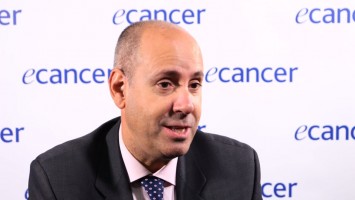Trastuzumab deruxtecan significantly improves PFS In breast cancer patients previously treated with endocrine therapy
Prof Giuseppe Curigliano - European Institute of Oncology, Milan, Italy
This is an important study. As you know perfectly, trastuzumab deruxtecan is approved for patients with HER2 low disease – immunohistochemical 1+ and 2+ with tissue amplified. All the data we have are coming from the DESTINY-Breast04 that used trastuzumab deruxtecan in patients after chemotherapy. What is going to do the DESTINY-Breast06 is to evaluate the activity of trastuzumab deruxtecan in patients who never received chemotherapy after progression to one or two lines of previous endocrine therapy. It will expand also the use of trastuzumab deruxtecan in those patients that we defined as HER2 ultra-low, I mean any staining between 0 and 1.
What was the methodology and what did you find?
This was a prospective randomised trial including patients with immunohistochemical 1+ and 2+ tissue amplified or HER2 ultra-low disease – any staining between 0 and 1. They received a maximum of two lines of endocrine therapy with biological treatment like CDK4/6 inhibitors and they have been randomised to trastuzumab deruxtecan versus chemotherapy of investigator choice.
In the final analysis, in the HER2 low population trastuzumab deruxtecan improved the median progression free survival from 8.1 months to 13.2 months. When evaluating also the patient population with HER2 ultra-low disease, I mean any staining between 0 and 1, trastuzumab deruxtecan improved median progression free survival from 8 months to 13.2 months. So the PFS improvement in HER2 low was consistent with the results in the HER2 low population.
Overall survival analysis is still immature, we had 40% of the events, but with the landmark analysis of one year both HER2 low and HER2 ultra-low have an improvement in overall survival from 78 months to 84 months.
I would like also to highlight that all subgroups derived exactly the same benefit and that the response rate was 57% in the intent to treat population versus 61% in the HER2 ultra-low. In the chemotherapy arm overall response rate was only 30%.
What adverse events were encountered?
This is an important question. The safety profile of trastuzumab deruxtecan was consistent with the data already available. Median treatment duration was 11 months for trastuzumab deruxtecan versus 5.6 months for investigator choice immunotherapy. We have to remember that adverse events of special interest included unfortunately interstitial lung disease. We observed 11% of ILD events, only three events were grade 5.
What could be the impact of this research?
DESTINY-Breast06 demonstrated trastuzumab deruxtecan as a new treatment option in patients with HER2 low and HER2 ultra-low population after one or two lines of previous endocrine therapy. So this is, of course, a new standard of care for those patients who progress on one or more lines of endocrine therapy and never received chemotherapy.








